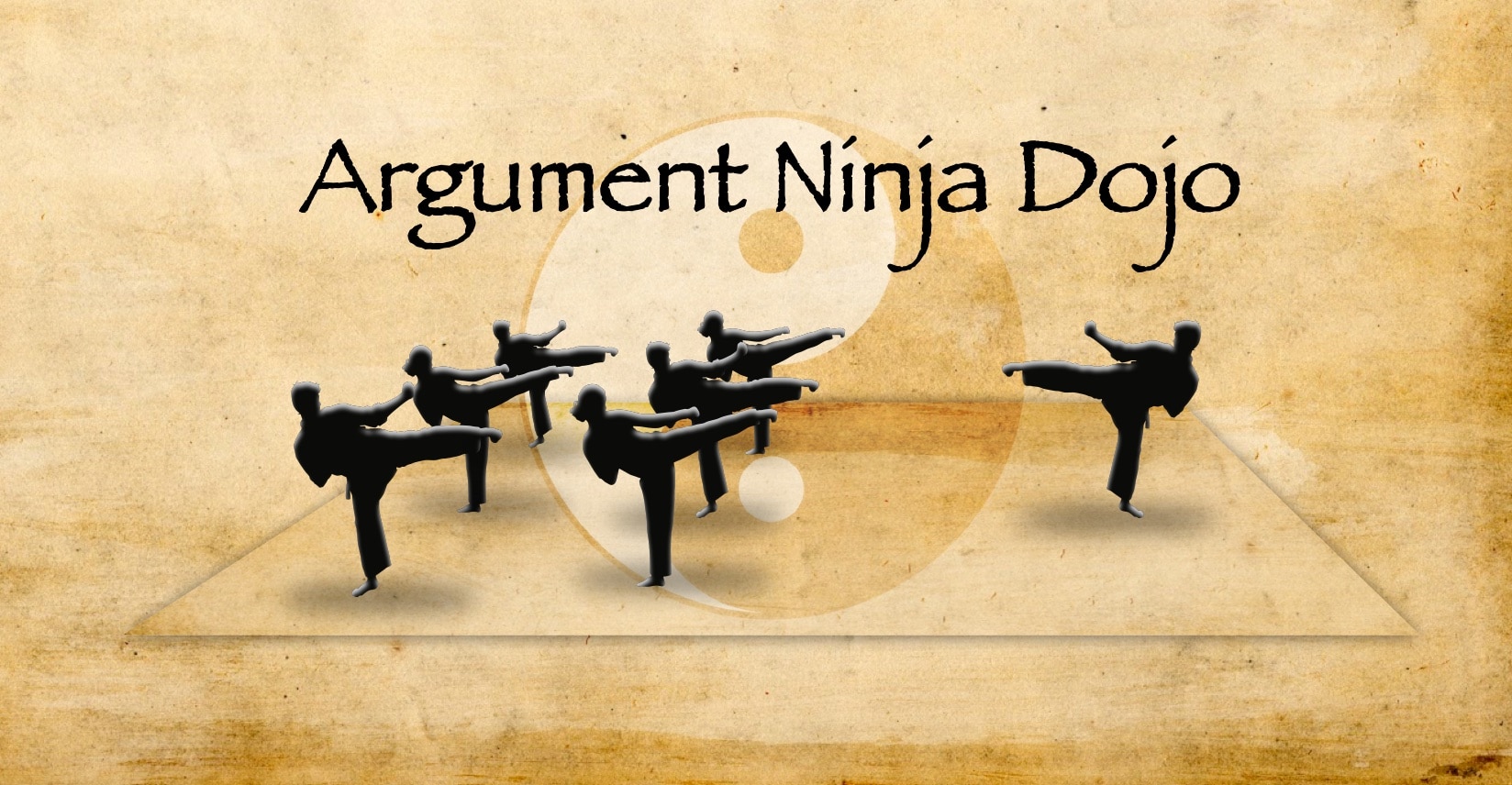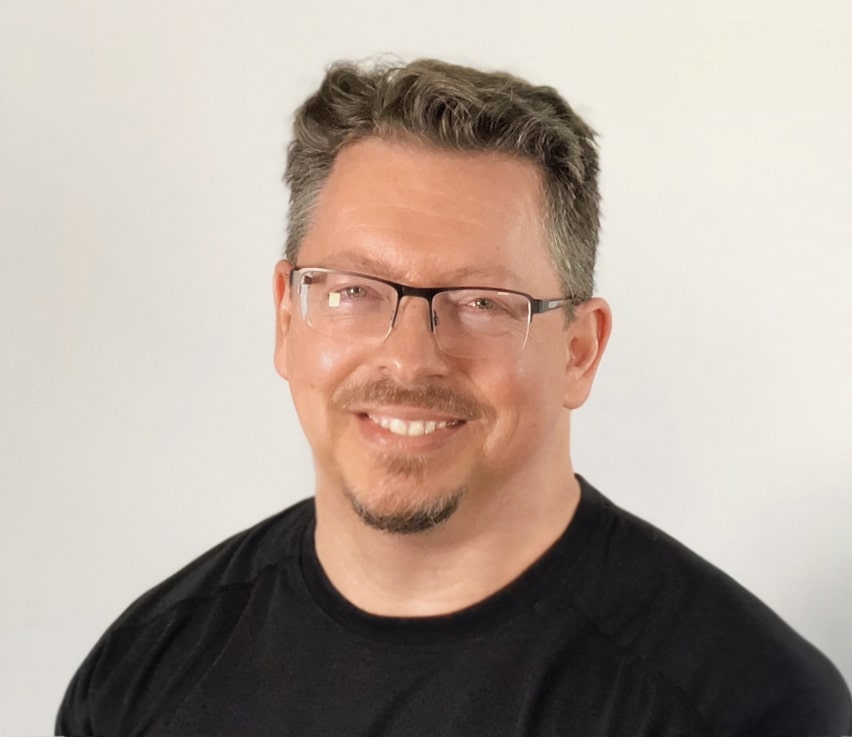
I’m an independent educator and consultant specializing in critical thinking education and training for individuals, institutions and businesses.
Below you can find more info on my background, my former academic career, and my current projects.
As a kid I was equally interested in the arts (sci-fi and fantasy books, comics, animation, film) and the sciences (astronomy, physics, biology …). I thought seriously about becoming a professional cartoonist, and developed some skills in this area.
 My cartooning background has continued to influence the content I create and my views on the value of visual communication.
My cartooning background has continued to influence the content I create and my views on the value of visual communication.
As a teen I was exposed to academic philosophy through a series of local university mini-courses for middle and high school students. Around the same time I became interested in foundational issues in the sciences (e.g. what is space?, what is time?, how does the brain work? what is consciousness?).
In 1991 I completed a Bachelor of Science degree in physics at Carleton University in Ottawa, Ontario, Canada (my hometown). My honours research project was on chaos theory, which I was attracted to because of its relevance to philosophical debates (determinism and predictability of nature, etc). I also took a number of philosophy courses at Carleton, coming very close to graduating with a second undergraduate degree.
I decided to apply to graduate school in philosophy at Western University (London, Ontario) to study the philosophy of science.
I spent seven years earning my Masters and PhD in philosophy at Western University (graduated in 1998). As a grad student I took a lot of courses in the philosophy of science, philosophy of physics, philosophy of mind, and ethics.
I taught Introduction to Philosophy for a couple of years, and I taught a large Environmental Philosophy class for three years.
My experience teaching Environmental Philosophy got me interested in conceptual issues in the philosophy of ecology and their relationship to problems in environmental philosophy. I ended up writing my doctoral dissertation in this area.
More specifically, in my dissertation I looked at foundational issues in the sciences of complexity (thermodynamics, network theory, self-organization theory, etc.) and their role in contemporary theoretical ecosystem ecology, and the relevance of these issues for some long-standing debates in environmental philosophy (e.g. the ontological and moral status of environmental “wholes”, like communities, ecosystems and landscapes).
When I went on the academic job market in 1997-1998, I applied for job openings in the philosophy of science and in environmental philosophy.
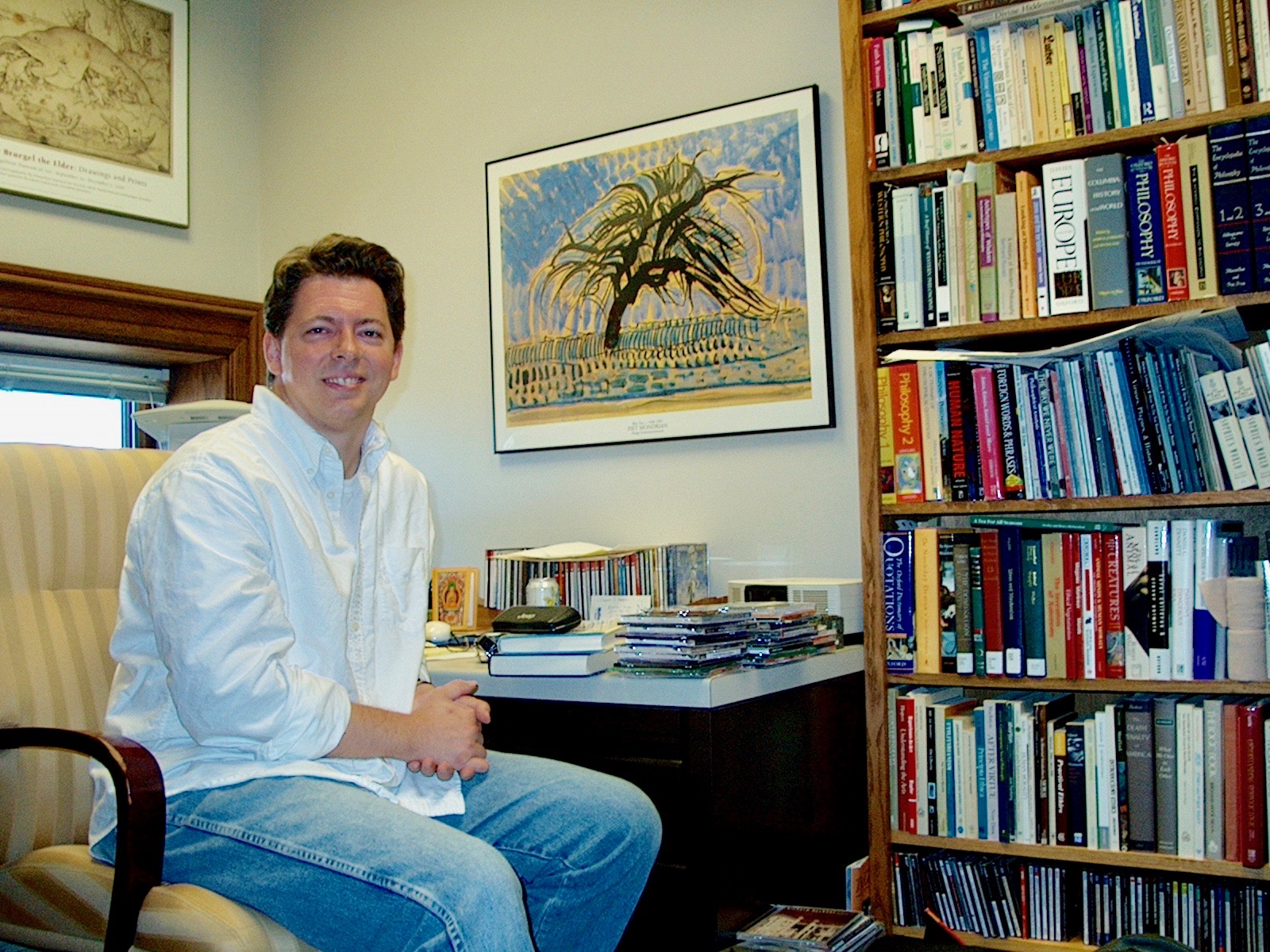
My first year out of graduate school (1998) I was a visiting Assistant Professor in the Department of Philosophy at Cape Breton University, in Sydney, Nova Scotia, Canada. The following year I began a tenure-track appointment in the Department of Philosophy & Religious Studies at Iowa State University, in Ames, Iowa, USA. I was hired as a philosopher of science.
My regular teaching duties at Iowa State included Philosophy of Science, Philosophy of Physics, and Introduction to Logic and Scientific Reasoning, which I basically treated as a critical thinking class. I later created a graduate course in History and Philosophy of Ecology, which I regularly co-taught with Arnold van der Valk, a member of Iowa State’s Department of Ecology, Evolution and Organismal Biology.
I earned tenure at Iowa State in 2005, and served as Department Chair from 2009-2013. My Chair duties included managing departmental budgets, annual performance reviews for approximately 30 faculty, leading departmental meetings, and acting as liaison between the department and the College of Arts and Sciences.
In 2015 I left my job at Iowa State and returned with my family to my hometown of Ottawa to pursue a new career as an independent educator and consultant.
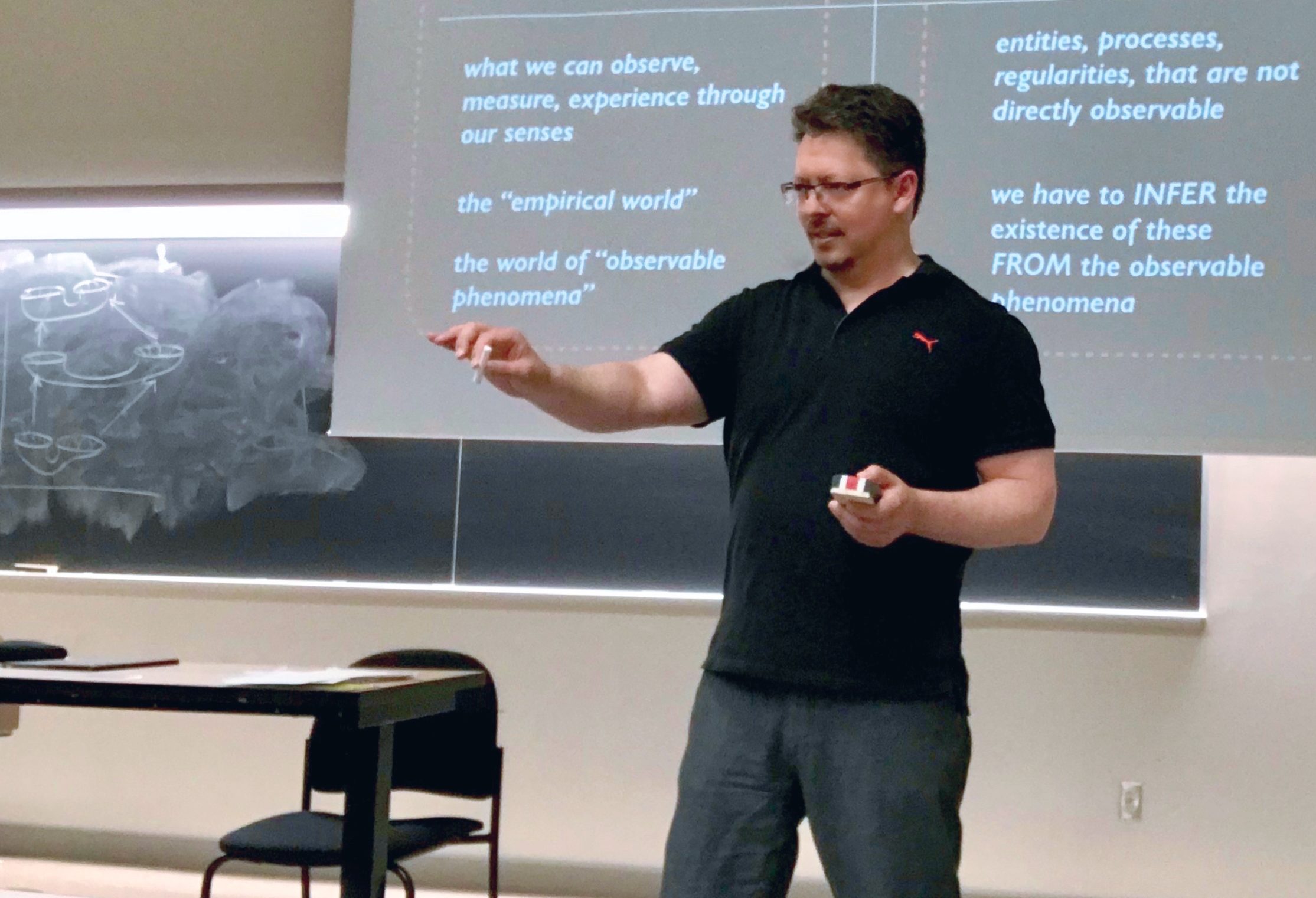
The list below includes courses I taught at Western University, Iowa State University, Cape Breton University, and the University of Zagreb, over the course of my academic career. I’ve grouped them by area.
History and Philosophy of Science
- Philosophy of Science
- Contemporary Philosophy of Science
- Natural Science
- History of Scientific Thought
- Philosophy of Physics
- Philosophy of Biology
- History and Philosophy of Ecology
- Ecology and Society
- Philosophy of Technology
Ethics and Social/Political Philosophy
- Business, Scientific and Environmental Ethics
- Moral Theory and Practice
- Ethics and Law
- Environmental Ethics
- Ethics and Society
- Introduction to Environmental Philosophy
- Professional Issues in Art Therapy
Introduction to Philosophy and Critical Thinking
- Introduction to Philosophy
- Introduction to Problems in Philosophy
- Introduction to Logic and Scientific Methodology
- Symbolic Logic
- Critical Thinking and Computer Applications
Independent Study Courses (1-2 students)
- Philosophy of Mathematics
- Space, Time and Einstein
- Perspectives on Ecosystem Health
- Science and Feminism
- The Ethics of Animals

In the mid-2000s I started creating video tutorials as teaching aids for my classes. In 2008 I launched a website where people could sign up and access about 6 hours of these video tutorials, covering a range of topics in logic and argumentation, formal and informal fallacies, and how to write a good argumentative essay. This website would eventually become the Critical Thinker Academy.
I accumulated approximately 25 hours of video course material for the Critical Thinker Academy website. This includes courses on cognitive biases and critical thinking, reasoning about chance and uncertainty, foundational issues in science literacy and the philosophy of science, and an extended course on critical reading and essay writing.
All of the video content that is on the Critical Thinker Academy site is also available at the Argument Ninja Dojo site (see below).
The main difference is that the Argument Ninja Dojo is a membership site with additional tiers. Members get access to all the content for a monthly recurring fee.
The Critical Thinker Academy offers individual video courses for a small per course fee ($9/course).
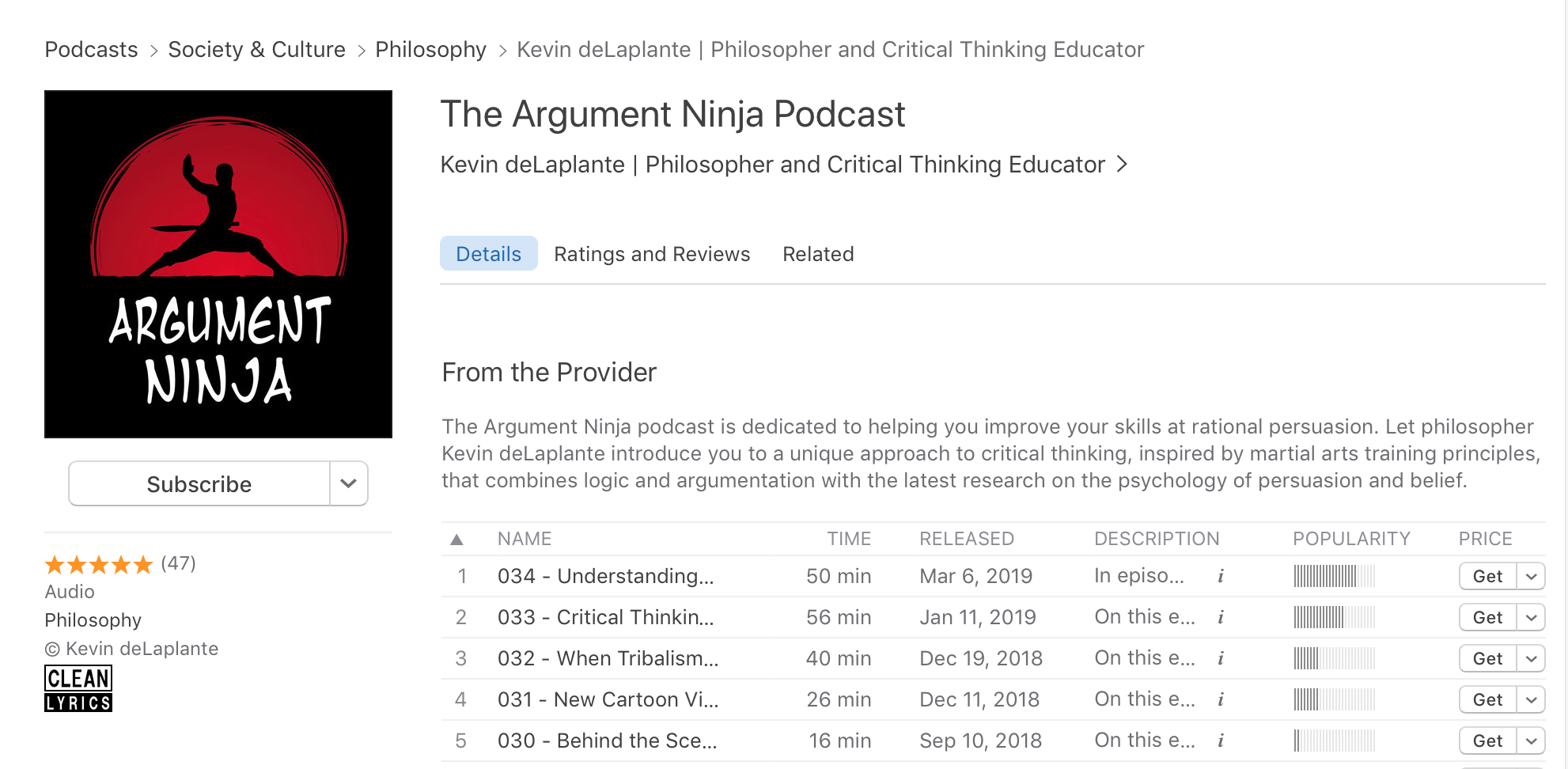
I started the Argument Ninja Podcast in 2016. I’ve used this platform to talk about the growing challenges of critical thinking in the 21st century, and to develop a new approach (the “Argument Ninja” approach) to critical thinking education and training that is inspired by analogies with training in the martial arts. This approach combines training in logic, argumentation and principles of good reasoning, with training in rhetoric and the art and science of persuasion.
The Argument Ninja Dojo is the current version of my membership site. You can access it via the DOJO link in top navigation menu.
This site offers resources, training and community support for people who want to develop their critical thinking and communication skills.
